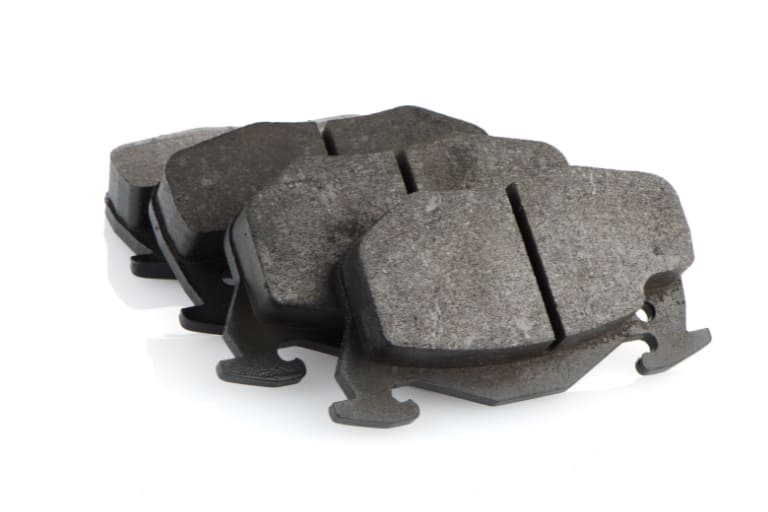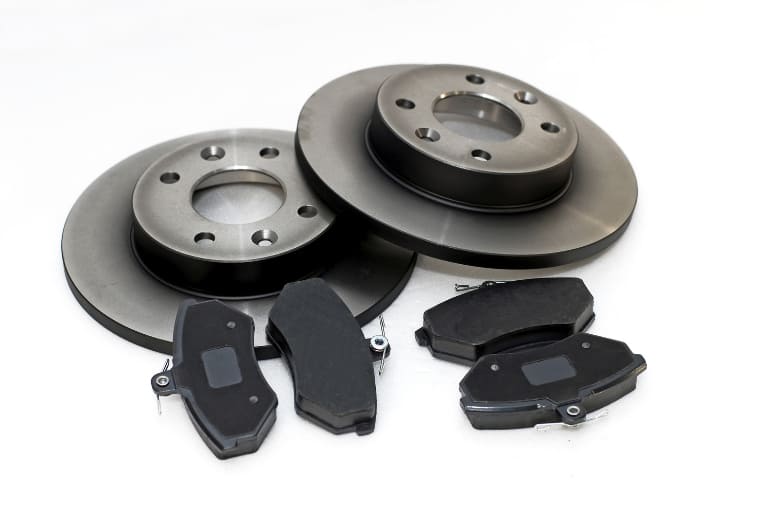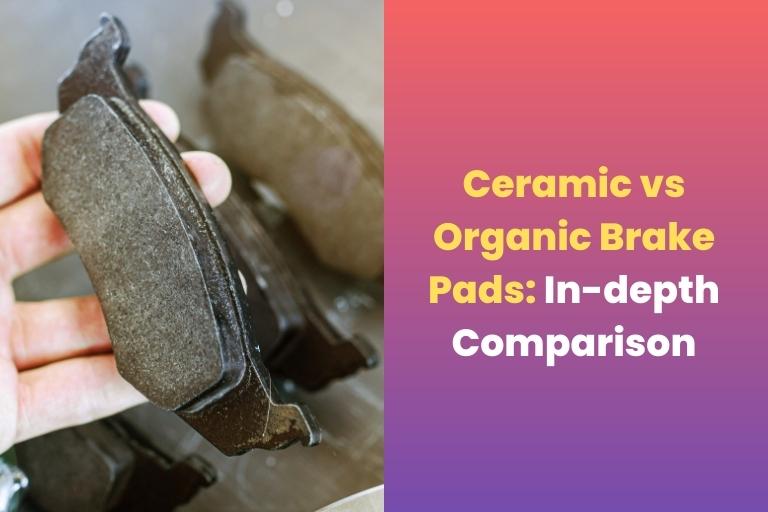We all understand the necessity of brakes, those magical systems that allow us to slow down or stop our vehicle completely. However, the braking system industry is massive. It gives its consumers a variety of possibilities. Thus it is always tricky for car owners to choose the most excellent suit for their needs.
Today, we’re delving headlong into the battle between ceramic and organic brake pads. And attempt to figure out what distinguishes ceramic brake pads from organic brake pads.
In this blog, we’ll explore the information surrounding these brake pad dynamos. And help you learn the benefits, drawbacks, and everything as we reveal the facts and descriptions of ceramic and organic brake pads.
Contents
Ceramic vs. organic brake pads

There are many little variations, but they must be considered. All of the distinctions between ceramic and organic brake pads are discussed below:
Ceramic Disc Brakes:
Construction:
Ceramic brake pads comprise a thick ceramic composition combined with copper fibers. Other materials, such as graphite, metal fibers, or lubricants, are frequently used.
Ceramic brake pads are well known for their ability to deliver consistent and dependable braking performance throughout a wide temperature range. They have strong stopping power and can withstand high temperatures without fading.
Noise:
Ceramic brake pads made less noise and screech than organic brake pads. They are designed to minimize braking noise and vibration.
Dust:
Ceramic brake pads generate less dust than organic brake pads. This helps to keep your wheels clean and hence increases their longevity.
Heat Resistance:
Ceramic brake pads are extremely heat resistant. They can tolerate high temperatures without losing efficiency, making them ideal for harsh driving situations.
Lifespan:
Ceramic brake pads have a longer lifespan than organic brake pads. They are made of a more rigid material and wear down at a slower pace, contributing to their lifetime.
Cost:
Ceramic brake pads often cost more than organic brake pads. The increased cost is due to the superior materials utilized in their production and their extended lifespan.
Overall brake performance:
Ceramic brake pads give an excellent overall performance. They have continuous braking power, are heat resistant, and are quiet. They are appropriate for most driving situations, including commuting and occasional spirited driving.
Warranty:
Ceramic brake pads have varying warranties depending on the manufacturer. For warranty information, it is recommended to contact the relevant brand or store.
Organic Brake Pads:
Construction:
Organic brake pads are made from a combination of organic elements such as rubber, glass, and resins. They are normally joined using heat and pressure.
Organic brake pads provide an excellent initial bite and modulation, making them suited for everyday driving. At lower temperatures, they provide smooth and consistent braking performance.
Noise:
When compared to ceramic brake pads, organic brake pads make greater noise and scream. Noise levels in various organic pad compositions have been lowered as manufacturing processes have advanced.
Dust:
Organic brake pads produce more brake dust than ceramic brake pads. This dust can build up on the wheels, necessitating more regular cleaning and a lower lifespan of the wheel.
Heat Resistance:
Organic brake pads are less heat resistant than ceramic brake pads. They may experience brake fade while braking for an extended period of time or intensely, particularly in high-performance driving scenarios.
Lifespan:
Organic brake pads often wear out faster than ceramic brake pads. Because organic pads are softer in composition, they may need to be replaced more frequently, especially for drivers with more forceful braking patterns.
Cost:
Typically, organic brake pads are less costly than ceramic brake pads. Their cheaper material prices and easier construction contribute to their affordability.
Overall brake performance:
Organic brake pads offer good performance in regular driving scenarios and for mild braking demands. They provide smooth and steady braking but may not function as well in hot or challenging driving situations.
Warranty:
Organic brake pads have varying warranties based on the manufacturer. For warranty information, it is recommended to contact the relevant brand or store.
Comparison Table ceramic brake pads vs. Organic brake pads
| Factors | Ceramic Brake Pad | OEM Brake Pad |
| Construction | Dense ceramic compound mixed with copper fibers and other materials | Mixture of organic materials such as rubber, glass, and resins |
| Noise | It is quiter | More noise and squeal (may vary) |
| Dust | Less dust | More dust (may vary) |
| Heat Resistance | Excellent heat resistance, handles high temperatures without fading | Less heat-resistant, may experience brake fade under high heat |
| Longitivity | Longer Lifespan | Lesser lifespan and wear out faster (as compared to ceramic brake pads) |
| Cost | More expensive | Affordable |
| Performance | Outstanding: provides steady and smooth stopping power | Suitable for regular driving, may not perform as well under high heat or demanding conditions |
| Warranty | Depends upon the brand | Depends upon the brand |
Advantages and disadvantages of ceramic and OEM brake pads
Advantages and disadvantages of ceramic brake pads
| Advatages | Disadvantages |
| Quieter operation | Poor absorber of heat |
| Reduced brake dust | Highly expensive |
| Long lifespan | Do not function in extreme cold |
| Better stoping power | Do not work in towing situation |
| Stable in a wide range of situations | Rotors may be damaged (in rare situations) |
| Improved recovery time after a complete stop | Less heat absorption than other friction compounds may result in greater braking system temperatures |
| Variety in particle sizes |
Advantages and disadvantages of organic brake pads
| Advantage | Disadvantage |
| Cost-effective | Lower heat resistance |
| Smooth and quiet operation | Reduced performance under high heat |
| Low to moderate dust | Faster wear and short lifespan |
| Gentler on rotors | Limited performance for high-performance driving |
| Suitable for everyday driving | Potential for brake fade |
Which is better Ceramic brake pads or organic brake pads?

When choosing between ceramic brake pads and organic brake pads, it’s essential to consider my specific needs and preferences. Ceramic brake pads excel in terms of heat resistance, lifespan, and dust reduction, but they are more expensive.
Organic brake pads, on the other hand, are cheaper or inexpensive, provide smooth functioning, and are suited for everyday driving. To discover which choice best matches you, consider aspects such as your performance needs, driving conditions, and budget.
You May Also Like to read the followings:
- How Close Should Brake Pads Be To Rotors?
- Can You Spray Brake Cleaner On Brake Pads? Does It Help?
- Can You Put Brake Pads On Backward? Why Should You Avoid?
- Brake Shudder After New Rotors And Pads? Here Is The Fix
- Are Brake Pads Interchangeable? Let’s Find Out
- Does The Emergency Brake Lock All Wheels?
- How Long Can You Drive On Grinding Brakes?
- Do Ceramic Brake Pads Contain Asbestos?
- Can You Use Front Brake Pads On The Rear?
- Why Does My Car Shake After Changing the Brake Pads?
- Should You Replace All 4 Brake Pads At Once?
- How to Install Anti-Rattle Clips on Brake Pads: Beginner’s Guide
- How Long Do Brake Pads Last: Brake Pad Lifespan Explained
- Driving Without Brake Pads: How Long is Safe?
- Fixing New Ceramic Brake Pads Making a Grinding Noise
- Ceramic vs. Semi-Metallic Brake Pads: Which is Better?
- Why Are My Brakes Grinding After New Pads And Rotors
- Ceramic vs OEM brake pads: Which is Better?
Conclusion
In conclusion, comparing ceramic and organic brake pads indicates numerous critical elements to consider before selecting.
Ceramic brake pads provide benefits such as heat resistance, lifespan, and decreased dust and noise. They are also more expensive at first, but they may deliver superior overall performance and have more extended warranties.
Organic brake pads, on the other hand, are less expensive and cause less rotor wear. They may, however, produce more dust, make more noise, and have a shorter lifetime.
Finally, the decision between ceramic and organic brake pads comes down to personal tastes and priorities since both varieties offer advantages and disadvantages.
